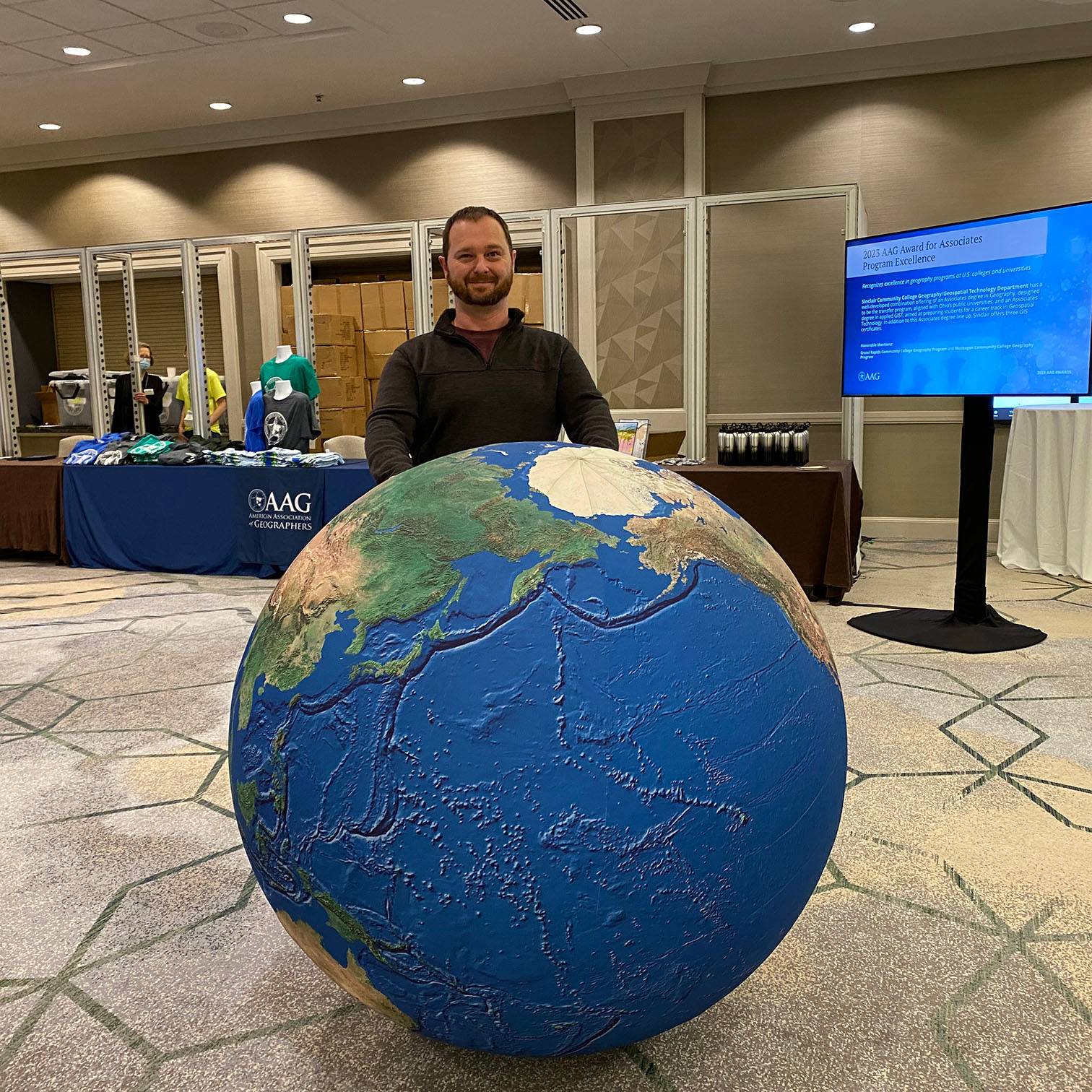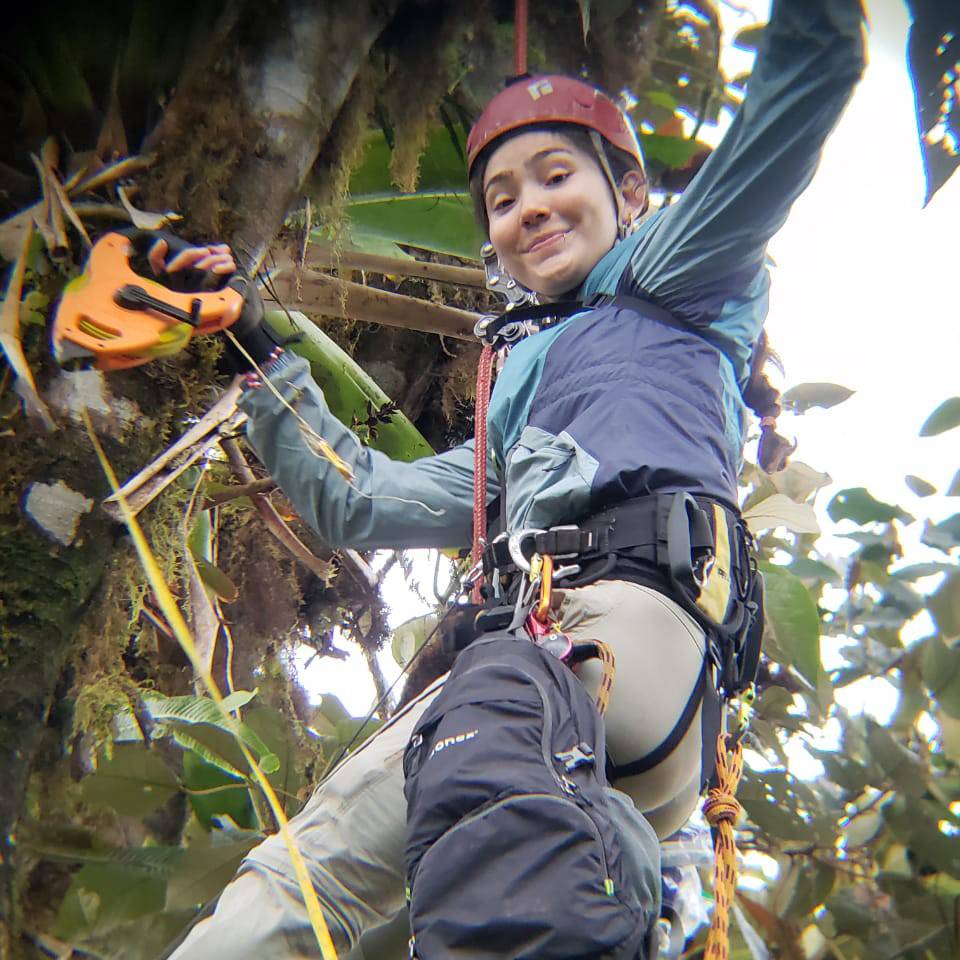The Graduate College is proud to announce the recipients of the 2025-2026 Outstanding Dissertation Awards, which recognize exceptional doctoral scholarship at Texas State University. These annual awards honor students whose dissertations reflect originality, research excellence, and meaningful contributions to their fields of study.
Adam Clark: The Story of Risk Told Through Maps and Editorial Cartoons

Adam Clark, Ph.D., an alumnus of the doctoral program in geography, has been selected as the winner of the 2025-2026 Graduate College’s Outstanding Dissertation Award in the Humanities and Fine Arts. His dissertation, “The Role of Cartography and Visualization in Hazard Risk Communication: An Examination of the Houston Chronicle, 1945 to 2020,” was directed by Ron Hagelman, Ph.D., professor in the Department of Geography and Environmental Studies.
Clark’s longstanding interest in severe weather and environmental processes initially drew him to geography, but his focus soon turned toward the human stories behind disasters.
“I am interested in how environmental and technological hazards affect people, how physical areas mitigate and recover from disasters, and how risk is communicated,” he said.
As a human geographer, Clark became increasingly curious about how meaning is constructed through media and public discourse.
“The more I learned, the easier it became to see the gaps between academic research and governmental planning and response,” he said.
This realization led him to explore how people perceive environmental risks—and how those perceptions are shaped by the cultural and political contexts in which communication occurs.
Clark credits his dissertation director, Hagelman, with providing invaluable guidance throughout the process.
“He helped me work through four or five dissertation topics before landing on this one,” he said. “He taught me what it takes to be a good student, researcher, scholar, and colleague, and I am eternally grateful to have had the opportunity to work with him.”
Hagelman highlighted the humanistic depth of Clark’s dissertation, which explores how maps and editorial cartoons shape public understanding of environmental risk along the Gulf Coast. Drawing from a media archive he built himself, Clark shows how graphic elements are used not only to interpret extreme events but also to amplify broader sociopolitical messages.
“Adam’s dissertation reminds us of the ubiquitous influence of symbols, imagery, and storytelling in our efforts to understand, respond to, and mitigate extreme environmental risks,” Hagelman said.
Clark thanked his committee members, Alberto Giordano, Ph.D., Eric Sarmiento, Ph.D., and Elyse Zavar, Ph.D., who provided essential support to ensure his work advanced the body of geographic knowledge.

He also expressed his deep gratitude to TXST. Over the course of 17 years, Clark has earned three degrees from the university, started work as a student employee, and for the last 13 years, has served as a full-time staff member. During this time, he has taken on leadership roles, including two years as chair of the university’s Staff Council, as well as involvement in various academic organizations.
“I have grown so much as an academic, researcher, colleague, and person during my nearly two decades at Texas State, and I owe so much to the wonderful people I have met and the myriad opportunities I have been given,” he said. “I even met my wife here during graduate school, and we are now expecting our first child in August.”.
Clark hopes to secure a tenured teaching position where he can both share his knowledge and provide meaningful guidance to the next generation of geographers.
Mar Moretta-Urdiales: Tracking a Deadly Fungus to Protect Amphibians

Mar-Moretta Urdiales, Ph.D., a student in the doctoral program in aquatic resources and integrative biology, has been awarded the 2025-2026 Graduate College’s Outstanding Dissertation Award in the Biological and Life Sciences. Her dissertation, “Host-pathogen dynamics of the amphibian-killing fungus in mainland Ecuador,” was directed by David Rodriguez, Ph.D., professor in the Department of Biology.
Moretta-Urdiales’ work statistically models the progression of emerging infectious diseases across diverse ecosystems—including coastal, highland, and Amazonian forests.
“Batrachochytrium dendrobatidis is a fungus that causes chytridiomycosis and has devastated amphibian populations worldwide” she said. “Understanding how diseases spread and what triggers outbreaks is critical to building targeted, effective conservation efforts. Knowing which ecosystems are most vulnerable to lethal pathogens can help protect entire populations.”
Rodriguez, her advisor, has been instrumental to her success.
“He saw potential in me years before I saw it in myself, inviting me to join his lab in 2019,” she said. “Since then, we’ve co-authored scientific papers, secured funding, and built a project that is both scientifically rigorous and impactful.”
Rodriguez praised both the rigor and reach of Moretta-Urdiales' work.
“She undertook incredibly challenging fieldwork, including single-rope tree climbing to sample bromeliads in forest canopies—an understudied habitat in disease ecology,” he said. “Mar has mentored students in Ecuador and Texas, engaged with communities during fieldwork, and championed girls and women in STEM. Her science is as much about people as it is about data.”
Moretta-Urdiales also credits Shawn McCracken, Ph.D., for shaping her as a scientist and conservationist.
“He taught me that science doesn’t have to be egocentric; it can build bridges between cultures and be a safe, inclusive space for growth rather than competition,” she said.
Growing up in Ecuador, she witnessed the rich biodiversity of her homeland alongside the damaging effects of deforestation, forest fragmentation, and destructive oil extraction.

“Seeing how these environmental issues impacted both nature and local communities shaped my commitment to conservation early on,” she said.
Moretta-Urdiales currently holds a postdoctoral researcher position in Mar Huertas’, Ph.D. lab at TXST, with future hopes to work in conservation with an NGO or government agency that values science-based decision-making and prioritizes the perspectives of local communities. Ultimately, she envisions establishing her own NGO to connect global conservationists, policymakers, and communities.
“My goal is to ensure conservation is informed not only by science but also by justice, equity, and collaboration across borders,” she said.
Looking Ahead
Andrea Golato, Ph.D., dean of The Graduate College, congratulated Clark and Moretta-Urdiales on their outstanding dissertations and impactful research.
“Their work exemplifies the depth, rigor, and relevance of the scholarship being conducted by our graduate students,” she said.
Both recipients will receive a $1,000 award and will be honored at The Graduate College’s awards ceremony in Spring 2026. Their dissertations have also been nominated for the prestigious CGS/ProQuest Distinguished Dissertation Award, which will be presented at the Council of Graduate Schools’ annual meeting in Washington, D.C., in December 2025.